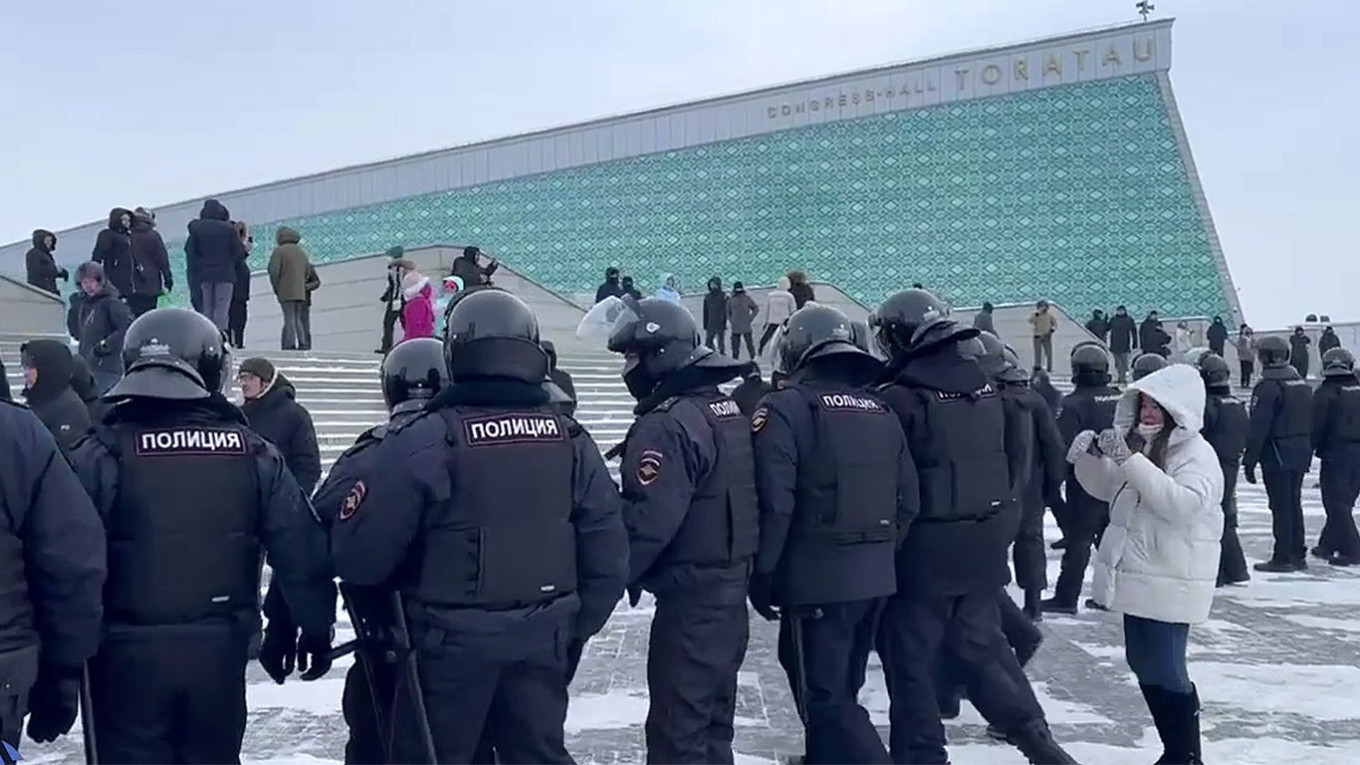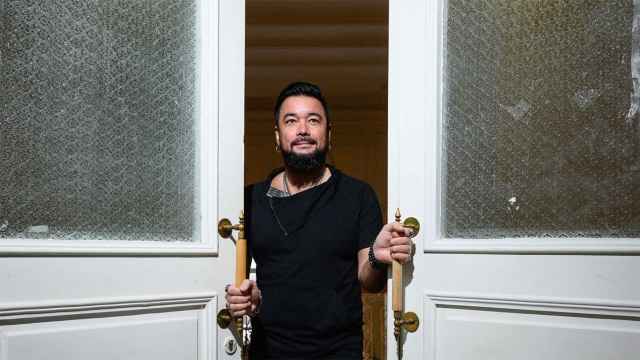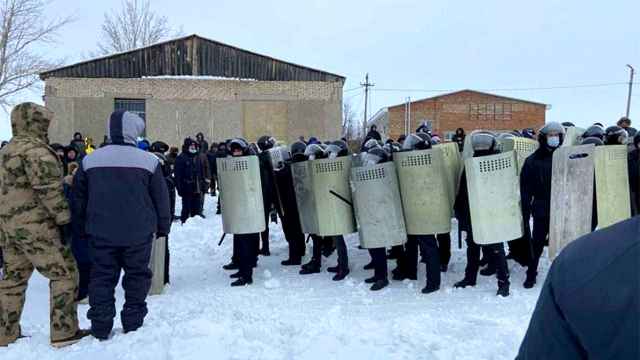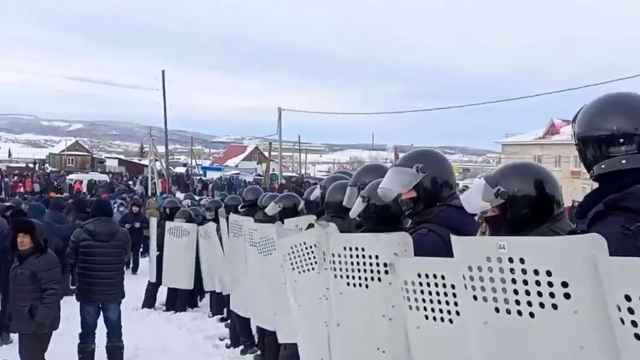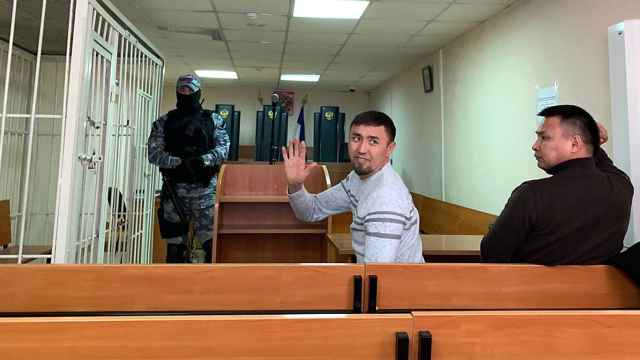A wave of arrests and detentions has swept Russia’s republic of Bashkortostan following last week’s protests in support of jailed Bashkir activist Fayil Alsynov.
Thousands of people protested against Alsynov’s sentencing to four years in a penal colony on charges of “inciting interethnic hatred” in some of the largest street protests in Russia since the invasion of Ukraine. Police were seen hitting protesters with batons and using tear gas and smoke grenades to disperse the crowds.
Courts in Bashkortostan have since opened at least 111 administrative cases linked to the rallies, according to regional news outlet Prufy.ru.
“The Baymak district is a very compact place, so when you talk to someone now, you always hear that their relative or neighbor or someone from their village has been taken by security forces,” a young woman from a village in the Baymak district told The Moscow Times, requesting anonymity due to safety concerns.
“People now talk about these arrests more than about Fayil,” she added.
At least 30 protest participants were rounded up and taken to detention centers in an unmarked bus that was seen roaming the streets of several villages in Baymaksky district on Sunday, according to reports from eyewitnesses and activists.
“Everyone here is scared, though…the stronger overarching feeling is disappointment,” said the local woman. “Disappointment not only with [Bashkortostan’s head] Radiy Khabirov but also with the head of the district [Fanis Aminev] who didn’t come out to speak with the people.”
On Thursday, security forces in the city of Salavat arrested 60-year-old Bashkir activist Alfinur Rakhmatullina, the Telegram channel RusNews reported, citing the activist’s daughter Lyaysan Ravilova.
Rakhmatullina, who is accused of “participating in mass unrest,” was taken by the police following a search at her house and her whereabouts remain unknown, according to RusNews.
Rakhmatullina is at least the seventh activist to face criminal charges in relation to the protests.
In the days since the latest protest in Ufa, Bashkortostan’s Kremlin-appointed head Radiy Khabirov has been doubling down on efforts to quash dissent by labeling Alsynov’s supporters “traitors,” “extremists” and “separatists.”
“We won’t allow for [further] such actions on our territory…I genuinely feel sorry for these inexperienced and silly little people who take part [in the rallies]...They will be punished,” Khabirov, the sole author of a denunciation letter that became the basis for the case against Alsynov, said during a government meeting Monday.
And in a statement made during his highly publicized working tour around the republic, Khabirov said those who participated in the gatherings “have no future at all.”
“What Khabirov is doing is spreading misinformation and undermining the trust in the federal government among Bashkirs and the residents of the eastern slopes of the Urals,” said Tagir Vakhitov, an ex-anchor at Bashkortostan’s flagship government-affiliated news channel who resigned from his post in a show of solidarity with the 2020 protests at Kushtau mountain.
“Bashkortostan doesn’t want to separate from the Russian Federation. We have been living as neighbors, shoulder to shoulder for so many years,” Vakhitov told The Moscow Times.
“What Bashkirs want is peace, [a] quiet [life] and to be treated as equals. They don’t want bulldozers and excavators to ride into their territories and treat their lands savagely.”
Prufy.ru reported Wednesday that Bashkortostan authorities are planning a government-sanctioned rally in support of Khabirov and under the slogan “Bashkortostan against extremism” on Friday.
In the absence of tangible support for Khabirov, the government is banking on mandatory attendance of state employees who are expected to be bussed into Ufa from across the republic, according to Prufy.ru’s sources.
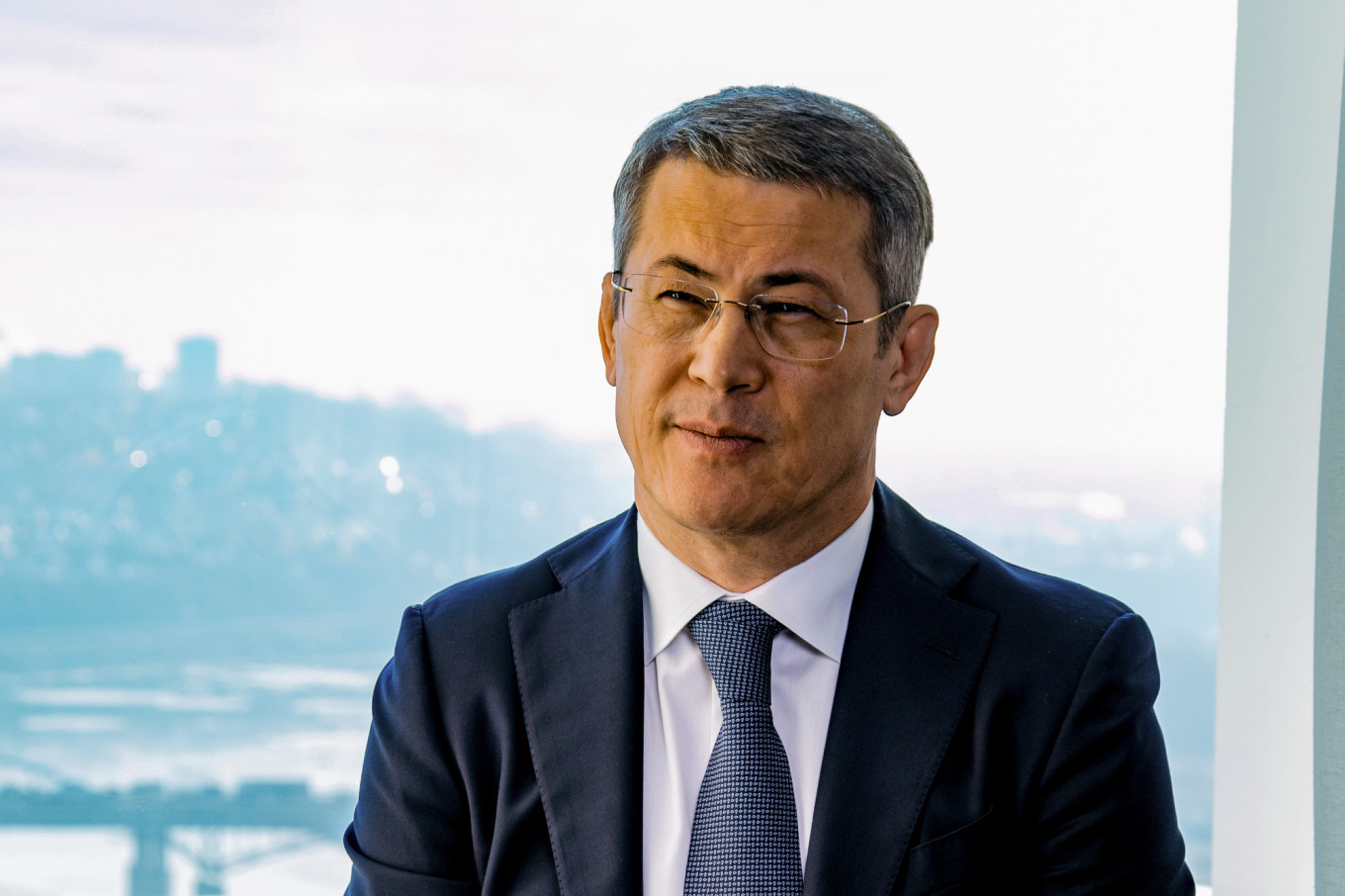
Meanwhile, Alsynov, who was sentenced over his active role in last year’s protests against illegal gold mining in southeastern Bashkortostan, has been transferred to a detention facility in the neighboring Chelyabinsk region, according to his lawyer Ilnur Suyundukov.
“Given the emergency situation that arose during the attempted transfer of Alsynov from the courthouse, the court believes it necessary to transfer the convict to…Magnitogorsk,” said the order posted on Suyundukov’s Telegram channel.
Despite Alsynov’s physical absence from Bashkortostan, many in the republic are bracing for a possible next wave of large-scale protests in his support, which are expected to coincide with an appeal hearing at the republic’s Supreme Court.
“People are scared now but I think there is still loads of anger underneath that,” said the resident of Baymak district, whose sentiment was echoed by an ethnic Bashkir woman from Ufa.
“I see many of my acquaintances becoming more political,” said the Ufa resident, who requested anonymity out of fears for her safety.
“I think more protests are possible and they will become more radical because people are losing hope for the better…People want to protest, want to express their disagreement — this is a major loss on the part of the government because they had the opportunity to start a dialogue,” she added.
But amid the restive spirit that has swept Bashkortostan, very few — if any — believe that protests could change the outcome of the appeal hearing on Alsynov’s case.
“Khabirov has taken matters firmly into his hands and [Bashkortostan’s] supreme court is still influenced by [the republic’s] white house, so my prognosis is very pessimistic,” said ex-journalist Vakhitov.
A Message from The Moscow Times:
Dear readers,
We are facing unprecedented challenges. Russia's Prosecutor General's Office has designated The Moscow Times as an "undesirable" organization, criminalizing our work and putting our staff at risk of prosecution. This follows our earlier unjust labeling as a "foreign agent."
These actions are direct attempts to silence independent journalism in Russia. The authorities claim our work "discredits the decisions of the Russian leadership." We see things differently: we strive to provide accurate, unbiased reporting on Russia.
We, the journalists of The Moscow Times, refuse to be silenced. But to continue our work, we need your help.
Your support, no matter how small, makes a world of difference. If you can, please support us monthly starting from just $2. It's quick to set up, and every contribution makes a significant impact.
By supporting The Moscow Times, you're defending open, independent journalism in the face of repression. Thank you for standing with us.
Remind me later.



